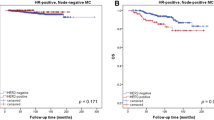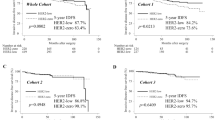Abstract
Purpose
Mucinous carcinoma (MC) is a rare breast cancer with favorable outcome. Unlike typical breast cancer, the current guidelines do not recommend chemotherapy or anti-human epidermal growth factor receptor 2 (HER2) therapy for hormone receptor (HR)-positive MC, regardless of HER2 status. We evaluated the prognostic implication of HER2 status in HR-positive MC.
Methods
We retrospectively reviewed the data of 471 patients with pure MC (stages I–III) who underwent curative surgery. We analyzed 5-year disease-free survival (DFS) and distant metastasis-free survival (DMFS), according to clinicopathological characteristics.
Results
The median follow-up duration was 79.0 months. Overall, the 5-year DFS rate was 95.7% and the 5-year DMFS rate was 96.2%. Nodal status was the only significant factor for DFS (relative risk [RR], 3.40; 95% confidence interval [CI] 3.40–9.67, p = 0.021). Among HR-positive/node-negative patients with tumor size ≥ 3 cm, HER2-positive patients showed significantly worse DFS (RR, 8.76; 95% CI 1.45–52.76, p = 0.018) and DMFS (RR, 11.37; 95% CI 1.37–74.70, p = 0.011). This finding was consistently significant, when combining both “HR-positive/node-negative/tumor size ≥ 3 cm” and “HR-positive/node-positive” MC (n = 125) for DFS (RR, 4.30; 95% CI 1.43–12.97, p = 0.009) and DMFS (RR, 4.93; 95% CI 1.63–14.90, p = 0.005). Intriguingly, within this subgroup, among HER2-positive tumors, whereas 5-year DFS was 60.2% in patients who did not receive trastuzumab, 100% of those who received trastuzumab were disease free (p = 0.053).
Conclusions
In HR-positive, node-negative MC with tumor size ≥ 3 cm, patients with HER2-positive MC showed worse survival, suggesting a potential role of an anti-HER2 strategy in this subgroup.



Similar content being viewed by others
References
Komaki K, Sakamoto G, Sugano H, Morimoto T, Monden Y. Mucinous carcinoma of the breast in Japan. A prognostic analysis based on morphologic features. Cancer. 1988;61(5):989–96.
André S, Cunha F, Soares J, Bernardo M, E Sousa JM, Cortez F. Mucinous carcinoma of the breast: a pathologic study of 82 cases. J Surg Oncol 1995;58(3):162–7.
Li CI. Risk of mortality by histologic type of breast cancer in the United States. Hormones Cancer. 2010;1(3):156–65.
Park S, Koo J, Kim J-H, Yang WI, Park B-W, Lee KS. Clinicopathological characteristics of mucinous carcinoma of the breast in Korea: comparison with invasive ductal carcinoma-not otherwise specified. J Korean Med Sci. 2010;25(3):361–8.
Anderson WF, Chu KC, Chang S, Sherman ME. Comparison of age-specific incidence rate patterns for different histopathologic types of breast carcinoma. Cancer Epidemiol Prevent Biomark. 2004;13(7):1128–35.
Di Saverio S, Gutierrez J, Avisar E. A retrospective review with long term follow up of 11,400 cases of pure mucinous breast carcinoma. Breast Cancer Res Treat. 2008;111(3):541–7.
Gradishar W, Anderson B, Balassanian R. NCCN guidelines version 1.2018: breast cancer. NCCN website nccn org/professionals/physician_gls/pdf/breast pdf Published March 2018, 20.
Diab SG, Clark GM, Osborne CK, Libby A, Allred DC, Elledge RM. Tumor characteristics and clinical outcome of tubular and mucinous breast carcinomas. J Clin Oncol. 1999;17(5):1442.
Bae SY, Choi M-Y, Cho DH, Lee JE, Nam SJ, Yang J-H. Mucinous carcinoma of the breast in comparison with invasive ductal carcinoma: clinicopathologic characteristics and prognosis. J Breast Cancer. 2011;14(4):308–13.
Ahn SH. Clinical characteristics of breast cancer patients in Korea in 2000—Invited response. Arch Surg. 2004;139(1):311.
Ahn SH, Yoo KY. Chronological changes of clinical characteristics in 31,115 new breast cancer patients among Koreans during 1996–2004. Breast Cancer Res Treat. 2006;99(2):209–14.
Allred DC, Harvey JM, Berardo M, Clark GM. Prognostic and predictive factors in breast cancer by immunohistochemical analysis. Mod Pathol. 1998;11(2):155–68.
Wolff AC, Hammond MEH, Hicks DG, Dowsett M, McShane LM, Allison KH, Allred DC, Bartlett JMS, Bilous M, Fitzgibbons P, et al. Recommendations for human epidermal growth factor receptor 2 testing in breast cancer: American Society of Clinical Oncology/College of American pathologists clinical practice guideline update. Arch Pathol Laboratory Med. 2014;138(2):241–56.
Edge S, Byrd D, Compton C, Fritz A, Greene F, Trotti A. AJCC (American Joint Committee on Cancer) cancer staging manual. 7. New York: Springer; 2010:1–12.
Louwman MW, Vriezen M, Beek MWV, Nolthenius-Puylaert MCBT, Sangen MJVD, Roumen RM, Kiemeney LA, Coebergh JWW. Uncommon breast tumors in perspective: incidence, treatment and survival in the Netherlands. Int J Cancer. 2007;121(1):127–35.
Komenaka IK, El-Tamer MB, Troxel A, Hamele-Bena D, Joseph K-A, Horowitz E, Ditkoff B-A, Schnabel FR. Pure mucinous carcinoma of the breast. Am J Surg. 2004;187(4):528–32.
Cho L-C, Hsu Y-H. Expression of androgen, estrogen and progesterone receptors in mucinous carcinoma of the breast. Kaohsiung J Med Sci. 2008;24(5):227–32.
Lesser ML, Rosen PP, Senie RT, Duthie K, Menendez-Botet C, Schwartz MK. Estrogen and progesterone receptors in breast carcinoma: correlations with epidemiology and pathology. Cancer. 1981;48(2):299–309.
Gündeş E, Aksoy F, Vatansev C, Çakır M. Pure and mixed mucinous carcinoma of the breast. J Breast Health. 2013;9:182–5.
Scopsi L, Andreola S, Pilotti S, Bufalino R, Baldini MT, Testori A, Rilke F. Mucinous carcinoma of the breast A clinicopathologic, histochemical, and immunocytochemical study with special reference to neuroendocrine differentiation. Am J Surg Pathol. 1994;18(7):702–11.
Sas-Korczyńska B, Mituś J, Stelmach A, Ryś J, Majczyk A. Mucinous breast cancer—clinical characteristics and treatment results in patients treated at the Oncology Centre in Kraków between 1952 and 2002. Contemporary Oncol. 2014;18(2):120.
Vo T, Xing Y, Meric-Bernstam F, Mirza N, Vlastos G, Symmans WF, Perkins GH, Buchholz TA, Babiera GV, Kuerer HM. Long-term outcomes in patients with mucinous, medullary, tubular, and invasive ductal carcinomas after lumpectomy. Am J Surg. 2007;194(4):527–31.
Rasmussen BB, Rose C, Christensen I. Prognostic factors in primary mucinous breast carcinoma. Am J Clin Pathol. 1987;87(2):155–60.
Clayton F. Pure mucinous carcinomas of breast: morphologic features and prognostic correlates. Human Pathol. 1986;17(1):34–8.
Norris HJ, Taylor HB. Prognosis of mucinous (gelatinous) carcinoma of the breast. Cancer 1965;18(7):879–85.
Memis A, Ozdemir N, Parildar M, Ustun EE, Erhan Y. Mucinous (colloid) breast cancer: mammographic and US features with histologic correlation. Eur J Radiol. 2000;35(1):39–43.
Fentiman I, Millis R, Smith P, Ellul J, Lampejo O. Mucoid breast carcinomas: histology and prognosis. Br J Cancer. 1997;75(7):1061.
Naqos N, Naim A, Jouhadi H, Taleb A, Bouchbika Z, Benchakroune N, Tawfiq N, Sahraoui S, Benider A. Mucinous carcinoma of the breast: clinical biological and evolutive profile [Carcinome mucineux du sein: profil clinique biologique et évolutif]. 2016.
Cao A-Y, He M, Liu Z-B, Di G-H, Wu J, Lu J-S, Liu G-Y, Shen Z-Z, Shao Z-M. Outcome of pure mucinous breast carcinoma compared to infiltrating ductal carcinoma: a population-based study from China. Ann Surg Oncol. 2012;19(9):3019–27.
Yerushalmi R, Gelmon K. Mucinous breast carcinoma: a large contemporary series. Breast Dis Year Book Quart. 2009;2(20):167.
Lacroix-Triki M, Suarez PH, MacKay A, Lambros MB, Natrajan R, Savage K, Geyer FC, Weigelt B, Ashworth A, Reis-Filho JS. Mucinous carcinoma of the breast is genomically distinct from invasive ductal carcinomas of no special type. J Pathol. 2010;222(3):282–98.
Rosen PP, Lesser ML, Kinne DW. Breast carcinoma at the extremes of age: a comparison of patients younger than 35 years and older than 75 years. J Surg Oncol. 1985;28(2):90–6.
Rasmussen BB. Human mucinous breast carcinomas and their lymph node metastases: a histological review of 247 cases. Pathol Res Pract. 1985;180(4):377–82.
Barkley CR, Ligibel JA, Wong JS, Lipsitz S, Smith BL, Golshan M. Mucinous breast carcinoma: a large contemporary series. Am J Surg. 2008;196(4):549–51.
Baretta Z, Guindalini RSC, Khramtsova G, Olopade OI. Resistance to trastuzumab in HER2-positive mucinous invasive ductal breast carcinoma. Clin Breast Cancer. 2013;13(2):156–8.
Hernandez IG, Marcos MC, Montemayor MG, Sotomayor DL, Ochoa DP, Macias GSG: Her-2 positive mucinous carcinoma breast cancer, case report. Int J Surg Case Rep. 2018;42:242–6.
Acknowledgment
This study was supported by a grant (2015-510) from the Asan Institute for Life Sciences and a grant (2017-1347) ‘Elimination of Cancer Project Fund’ from Asan Cancer Institute, Asan Medical Center, Seoul, Korea.
Author information
Authors and Affiliations
Corresponding author
Ethics declarations
Disclosure
None.
Conflict of interest
The authors declare no conflict of interest.
Additional information
Publisher's Note
Springer Nature remains neutral with regard to jurisdictional claims in published maps and institutional affiliations.
Rights and permissions
About this article
Cite this article
Gwark, Sc., Lee, H.S., Lee, Y. et al. Clinical Implication of HER2 Status in Hormone Receptor-Positive Mucinous Breast Cancer. Ann Surg Oncol 26, 2166–2174 (2019). https://doi.org/10.1245/s10434-019-07332-9
Received:
Published:
Issue Date:
DOI: https://doi.org/10.1245/s10434-019-07332-9




